Photographs: Reuters Surajeet Das Gupta and Sharmistha Mukherjee in New Delhi
Gujarat Chief Minister Narendra Modi has a big reason to thank his West Bengal counterpart, Mamata Banerjee. Her staunch opposition to the Tata Nano gave the Gujarat chief minister a foothold in the country's automobile map.
To his credit, Modi not only grabbed the opportunity with both hands, but also ensured he got to be in the driver's seat as far as attracting automobile investment was concerned.
Consider this: by 2015-16, nearly one of every three cars that roll out in the country could be from Gujarat. If that's not enough, in the next three-five years, half the installed capacity for making cars in India will be located in the state.
Just two years ago, the Sanand-Mehsana hub where most of the new car projects are being set up was nowhere on the country's auto map, then dominated by the big boys in the Pune-Chakan-Aurangabad belt of Maharashtra, the Chennai hinterland of Tamil Nadu and the Gurgaon-Manesar belt in Haryana.
. . .
Why global auto majors are RUSHING to Gujarat
Photographs: Reuters
With car makers from Maruti Suzuki, Peugeot PSA, Ford India and Kia Motors, apart from the Tatas and General Motors, making a beeline, the Gujarat government has cleared or is in advanced stages of negotiations for additional capacity to make nearly three million cars per annum, starting 2014.
Emphasising the trend, Abdul Majeed, PricewaterhouseCoopers partner who leads auto practice in India, says, "Over the next three-five years, we estimate Gujarat will have an installed capacity of over three million per annum, nearly half of the total capacity in the country by then."
To look at it from another perspective, the car industry had projected total car sales would be 4.5-5 million by financial year 2015-16.
Assuming that slightly more than half the capacity planned in Gujarat will be available by then, a third of the cars sold in the country should roll out of Gujarat, according to industry experts.
. . .
Why global auto majors are RUSHING to Gujarat
Photographs: Reuters
The total investment of these new projects is estimated at more than Rs 26,000 crore (Rs 260 billion), not including the ones where talks are still on.
Those shifting to Gujarat have good reasons. Maruti Suzuki, for example, is the largest investor in the auto sector in Gujarat and has signed a pact with the state government to set up a two million per annum capacity plant in Mehsana district. The investment tag is Rs 18,000 crore (Rs 180 billion).
The company has all its capacity currently in Haryana, where it is facing serious problems with workers forcing it to close the Manesar factory thrice this year. So, it has obviously resolved not to put all its eggs in one basket.
"I think all major projects on expansion and new projects are now coming to Gujarat. I have not heard of any going to other locations. The capacity being built up there will be equivalent to what is currently available across the country for cars," points out R C Bhargava, chairman, Maruti Suzuki India Limited (MSIL).
. . .
Why global auto majors are RUSHING to Gujarat
Photographs: Reuters
There are three reasons for the Japanese giant's faith in Gujarat:
One, proximity to Mundhra port reduces its freight costs as most ships that handle cars now come to Mundhra instead of Mumbai or Nava Sheva.
Secondly, Bhargava says there is a perception the government is more pro-active in clearing projects.
Thirdly, land acquisition is not troublesome. About half of the 1,400 acres earmarked for Maruti is land already acquired by the government.
. . .
Why global auto majors are RUSHING to Gujarat
Photographs: Reuters
"For the rest, the government is open about supporting us to negotiate the commercial terms with farmers. In other states, they don't want to be seen," adds Bhargava.
Ford India, currently located in Chennai with a capacity of 200,000 per annum, has preferred to go to Gujarat and build a much larger plant there, instead of sticking to the south.
The company will also build an engine plant in the state with a capacity of 270,000 per annum.
Michael Boneham, president and managing director, Ford India, says, "The new facility at Gujarat will complement our world-class operations and facilities in Tamil Nadu wonderfully. Ford selected Gujarat because of its pro-business environment, infrastructure, access to ports and skilled workforce. Our second plant in Sanand will give us access to the north-western region, which is by and large the biggest market for passenger cars in the country. Gujarat will also help us get access and balance in India from a logistics aspect."
. . .
Why global auto majors are RUSHING to Gujarat
Photographs: Reuters
But, the newfound aura around Gujarat could lead to its own problems, the biggest being in getting skilled labour attuned to the auto industry. Says a director of a well known international car company which has been scouting opportunities in India, "Gujarat's development has been based on oil and petrochemicals, so there is bound to be a shortage of skilled auto labour and that could be a challenge."
He also points out the state has doled out huge land tracts for projects, which is not required, and many of the large production numbers promised may not even come though.
"Car companies are taking 1,000 acres of land to build half a million cars. In Japan, they do more numbers in less than 100 acres. So, is it just a land play or will the project actually come?" he asks.
The production numbers of Nano have not lived up to expectations. It sold a little more than 140,000 in the 18 months from July 2009, though the projection was of more than 240,000 cars annually.

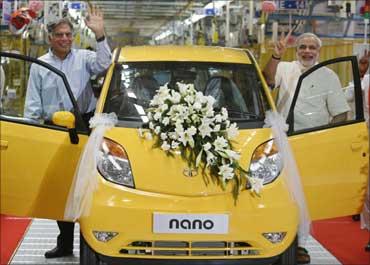
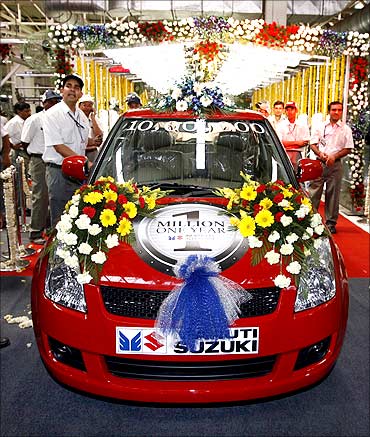

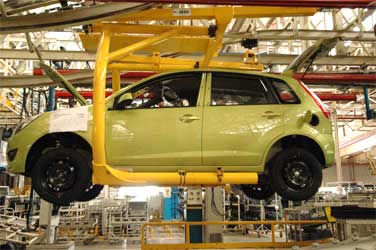
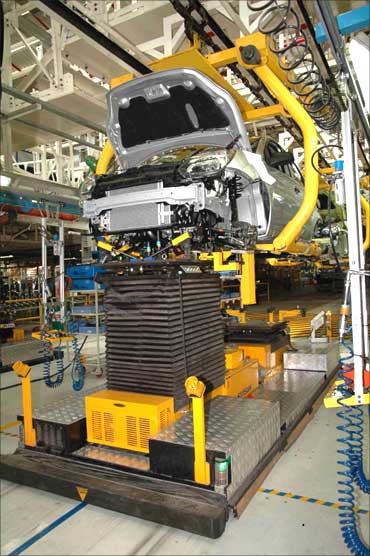
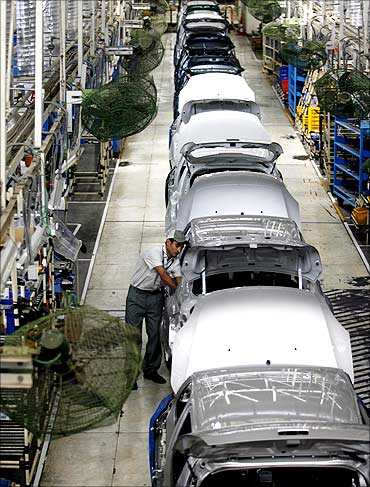

article